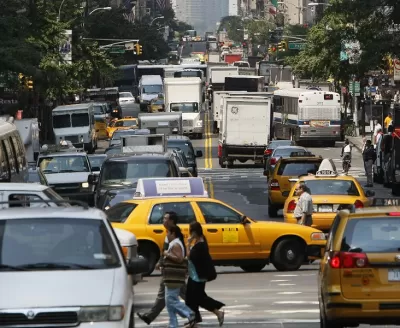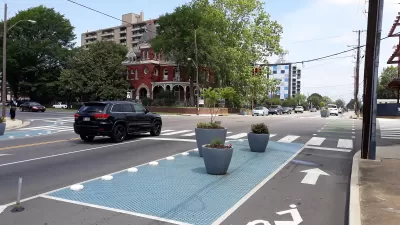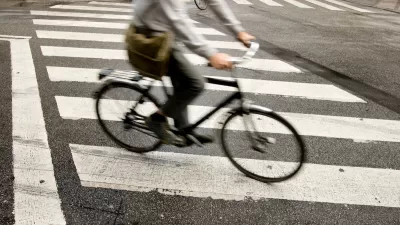The dominant narrative is that streets are for cars and infrastructure that accommodates driving is necessary for cities to grow. But cities ended up this way because of decisions that make other modes secondary.

Jacob Bacharach laments the current state of cities and urban design that prioritizes driving over other modes, even with a rise in pedestrian and cyclist deaths in recent years. "Streets belong to cars. The rest of us are interlopers, invaders, invasive species."
He also argues that most political leaders and the media continue to champion transportation systems that favor cars. "Newspapers relentlessly editorialize about massive road and highway projects as absolute fundamentals of economic wellbeing and development, whereas rail and bike lanes and other multi-modal transit options are generally treated as luxe amenities at best, or public menaces at worst."
But, says Bacharach, car-centric cities are the result of policy, planning, and design decisions that have encouraged infrastructure that privileges cars. While he is not optimistic about great change in the future, he does point to Paris as an example of how city leaders can drastically rethink urban transportation and the diversity of users. "Anne Hidalgo, the mayor of Paris, who has been on a great spree of road reduction and pedestrianization, recently said that she wants her city to become a place 'where you can let go of your child’s hand.'"
FULL STORY: THE FUTURE IS FOUR WHEELS, CYCLISTS BE DAMNED

Alabama: Trump Terminates Settlements for Black Communities Harmed By Raw Sewage
Trump deemed the landmark civil rights agreement “illegal DEI and environmental justice policy.”

Study: Maui’s Plan to Convert Vacation Rentals to Long-Term Housing Could Cause Nearly $1 Billion Economic Loss
The plan would reduce visitor accommodation by 25% resulting in 1,900 jobs lost.

Why Should We Subsidize Public Transportation?
Many public transit agencies face financial stress due to rising costs, declining fare revenue, and declining subsidies. Transit advocates must provide a strong business case for increasing public transit funding.

Paris Bike Boom Leads to Steep Drop in Air Pollution
The French city’s air quality has improved dramatically in the past 20 years, coinciding with a growth in cycling.

Why Housing Costs More to Build in California Than in Texas
Hard costs like labor and materials combined with ‘soft’ costs such as permitting make building in the San Francisco Bay Area almost three times as costly as in Texas cities.

San Diego County Sees a Rise in Urban Coyotes
San Diego County experiences a rise in urban coyotes, as sightings become prevalent throughout its urban neighbourhoods and surrounding areas.
Urban Design for Planners 1: Software Tools
This six-course series explores essential urban design concepts using open source software and equips planners with the tools they need to participate fully in the urban design process.
Planning for Universal Design
Learn the tools for implementing Universal Design in planning regulations.
Smith Gee Studio
Alamo Area Metropolitan Planning Organization
City of Santa Clarita
Institute for Housing and Urban Development Studies (IHS)
City of Grandview
Harvard GSD Executive Education
Toledo-Lucas County Plan Commissions
Salt Lake City
NYU Wagner Graduate School of Public Service




























